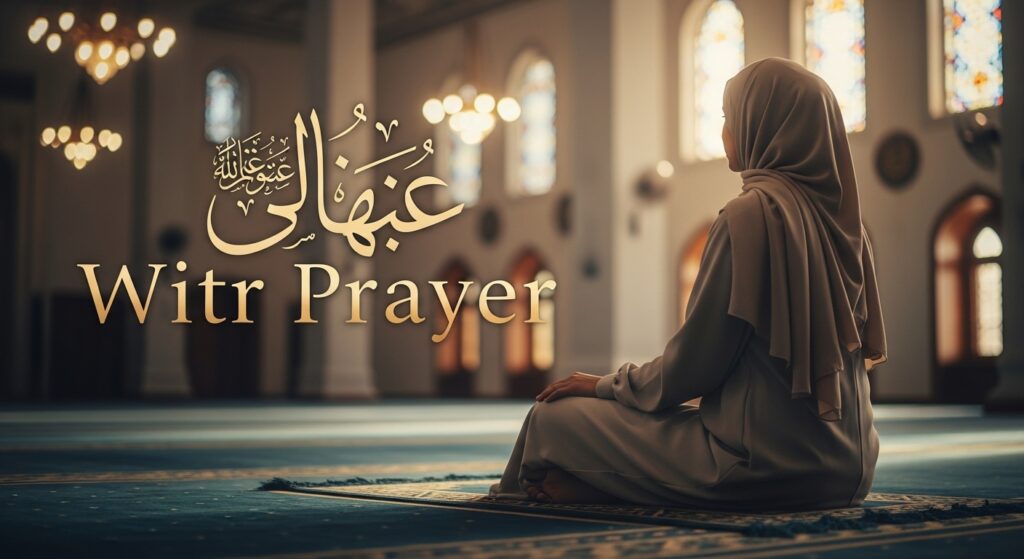Understand the importance of Witr prayer in Islam. Learn how to pray Witr step by step and recite Dua Qunoot with meaning.
Introduction
The Witr prayer is a special Islamic prayer that holds a unique place in the daily worship of Muslims. It is performed after the Isha prayer and before the Fajr prayer, making it the final prayer of the night. The word “Witr” means odd and this prayer is offered in an odd number of rakahs such as one, three, five or more.
Muslims view the Witr prayer as a way to end the day with remembrance of Allah. It strengthens faith, brings inner peace and protects a believer through the night. This prayer is closely connected to the Isha prayer, which makes it an important part of the daily routine of worship.
Prophet Muhammad ﷺ gave great importance to the Witr prayer and never left it whether he was at home or on a journey. His practice shows how valuable this prayer is for every Muslim who wishes to follow his Sunnah. By performing Witr regularly a believer gains closeness to Allah and ensures that their day ends with devotion and mercy.

What Is Witr Prayer in Islam?
The Witr prayer is an important part of Islamic worship that Muslims perform at night. The word Witr means“odd,” and the prayer is always offered in an odd number of rakahs. Muslims can pray one, three, five, seven or more rakahs but the most common way is three.
You pray Witr after finishing the Isha prayer and before the Fajr prayer. This makes it the last prayer of the day and a way to complete your daily prayers with devotion. Many scholars describe Witr as a special prayer that seals the night with remembrance of Allah.
Prophet Muhammad ﷺ strongly encouraged Muslims to pray Witr. He himself never missed it, whether he was at home or traveling. His example shows how much value Islam places on this prayer. Some Islamic schools of thought consider Witr wajib (necessary) while others regard it as Sunnah muakkadah (a highly recommended Sunnah).
When Muslims pray Witr regularly they follow the Sunnah of the Prophet ﷺ and strengthen their bond with Allah. It becomes a habit that adds peace to the heart and blessings to daily life.
Importance of Witr Prayer in Islam
The Witr prayer plays a powerful role in a Muslim’s daily worship. It completes the night prayers and allows believers to end their day by remembering Allah. When Muslims pray Witr after Isha they actively show their devotion and seek Allah’s mercy before resting.
Prophet Muhammad ﷺ gave clear guidance about Witr. He prayed it every night and told his companions not to neglect it. His actions and words prove how much Islam values the Witr prayer. The companions followed his example and made Witr a regular part of their worship which shows its deep importance in Islamic practice.
Islamic scholars also stress the value of Witr. The Hanafi school declares it wajib meaning necessary, while other schools describe it as Sunnah muakkadah a highly recommended Sunnah. Either way, Muslims gain great reward when they keep it consistent.
When you pray Witr sincerely you strengthen your faith and bring peace to your heart. You protect yourself from sins and draw closer to Allah. The true importance of Witr prayer in Islam shines in the way it enriches your faith, increases your blessings, and connects you with Allah every night.
How to Pray Witr Prayer Step by Step
The most common way is to pray three rakahs.
Step 1: Make the intention
Begin with the intention in your heart to perform Witr for the sake of Allah. This helps you focus and start your prayer with sincerity.
Step 2: Pray the first two rakahs
Stand, recite Surah Al-Fatiha, and follow it with another surah. Complete the first rakah with bowing and prostration then rise for the second. Pray the second rakah in the same way.
Step 3: Sit for tashahhud
After the second rakah sit and recite the tashahhud. Do not end the prayer with salam yet because a third rakah remains.
Step 4: Stand for the third rakah
Rise again and recite Surah Al-Fatiha along with another surah. After finishing the recitation raise your hands and say “Allahu Akbar.” Then recite Dua Qunoot before going into bowing.
Step 5: Complete the prayer
Finish the third rakah by bowing, prostrating and then sitting for the final tashahhud. End with salam to the right and left.
Muslims who pray more than three rakahs usually pray two rakahs at a time, give salam and then add one rakah separately. In this way, the prayer always ends with an odd number.
Praying Witr in this step-by-step way helps Muslims follow the Sunnah of Prophet Muhammad ﷺ and finish the night with devotion. It is a simple practice but it brings peace and blessings to daily life.
Dua Qunoot in Witr Prayer
The Dua Qunoot is a special supplication that Muslims recite in the last rakah of the Witr. It reflects humility, submission and the desire for Allah’s mercy and guidance.
When to recite Dua Qunoot
You recite the Dua Qunoot after completing the recitation in the last rakah. Raise your hands, say“Allahu Akbar,” and then recite the supplication before bowing. Scholars agree that this practice follows the Sunnah of Prophet Muhammad ﷺ who taught his companions to include it in their Witr.
Arabic text of Dua Qunoot
Arabic:
اللَّهُمَّ إِنَّا نَسْتَعِينُكَ وَنَسْتَغْفِرُكَ، وَنُؤْمِنُ بِكَ، وَنَتَوَكَّلُ عَلَيْكَ، وَنُثْنِي عَلَيْكَ الْخَيْرَ، وَنَشْكُرُكَ وَلَا نَكْفُرُكَ، وَنَخْلَعُ وَنَتْرُكُ مَنْ يَفْجُرُكَ.
اللَّهُمَّ إِيَّاكَ نَعْبُدُ، وَلَكَ نُصَلِّي وَنَسْجُدُ، وَإِلَيْكَ نَسْعَى وَنَحْفِدُ، نَرْجُو رَحْمَتَكَ، وَنَخَافُ عَذَابَكَ، إِنَّ عَذَابَكَ الْجِدَّ بِالْكُفَّارِ مُلْحَقٌ.
English Translation:
“O Allah, we seek Your help and ask Your forgiveness. We believe in You and place our trust in You. Your name deserves the highest praise, and we show gratitude without denying Your favors. Those who disobey You, we abandon and reject.
O Allah, You alone we worship. For You we pray and prostrate. To You we strive and hasten. We hope for Your mercy and fear Your punishment. Indeed, Your punishment will surely reach the disbelievers.”
Reciting this dua strengthens faith and builds a personal connection with Allah. Muslims who practice it regularly feel peace in their hearts and confidence in Allah’s protection.
Difference Between Witr Prayer and Tahajjud Prayer
Many Muslims ask about the difference between Witr prayer and Tahajjud prayer, since both are offered at night. While they are connected, each has its own purpose and ruling.
The Witr prayer is prayed after Isha and before Fajr. It always ends with an odd number of rakahs, such as one, three, or five. Witr serves as the closing prayer of the night. Prophet Muhammad ﷺ never missed Witr and encouraged every Muslim to perform it regularly. Some scholars classify it as wajib (necessary), while others call it Sunnah mu’akkadah (highly recommended).
The Tahajjud prayer is a voluntary night prayer that Muslims pray after sleeping for a part of the night. It is not tied to a fixed number of rakahs, and believers can pray as much as they like. The Quran praises those who wake up in the middle of the night to pray describing them as people close to Allah.
You can pray Tahajjud first and then finish with Witr since Witr should be the last prayer of the night. This way a Muslim benefits from both: the spiritual reward of Tahajjud and the completion of night worship with Witr.
In short the main difference lies in their timing and status. Tahajjud is optional and highly rewarding while Witr is necessary or strongly recommended. By praying both a Muslim earns greater reward and strengthens their connection with Allah.
Benefits of Witr Prayer for a Muslim
The Witr prayer brings many spiritual and personal benefits to a Muslim’s life. By praying Witr regularly, you strengthen your connection with Allah and end your night with His remembrance. This habit creates peace in the heart and builds consistency in worship.
One benefit of Witr is that it protects the believer from neglecting night worship. Even if you do not wake up for Tahajjud, Witr ensures that you have prayed before sleeping. This way, you close your day with obedience to Allah.
Another benefit is that Witr increases closeness to Allah. Prophet Muhammad ﷺ prayed Witr every night and urged his companions to do the same. Following his Sunnah allows you to gain extra reward and spiritual strength.
Witr also helps you seek forgiveness and mercy through Dua Qunoot. In this prayer you ask Allah to guide you, protect you and bless you. These words fill your heart with hope and keep you aware of Allah’s power.
In short, the benefits of Witr prayer go beyond rewards in the Hereafter. They also bring peace, focus, and blessings in everyday life, making it a prayer that every Muslim should value.
Common Mistakes in Witr Prayer
Many Muslims want to pray Witr correctly but sometimes fall into simple mistakes. Knowing these mistakes helps you avoid them and improves your worship.
One common mistake is skipping Witr altogether. Some people pray Isha but forget Witr or consider it optional without importance. Prophet Muhammad ﷺ never left Witr and he encouraged every Muslim to pray it. Ignoring it regularly means missing out on great blessings.
Another mistake is confusing Witr with Tahajjud. Both are night prayers but they are not the same. Witr isprayed after Isha and before Fajr, while Tahajjud comes after some sleep. Mixing them up can cause you to miss the Sunnah practice.
Some Muslims also recite Dua Qunoot incorrectly or leave it out when praying three rakahs. Reciting Qunoot in the last rakah follows the Sunnah, and learning it properly ensures you perform the prayer as taught.
A further mistake is ending Witr with an even number of rakahs. The prayer must remain odd one, three, five, or more. Ending with two or four rakahs goes against the meaning of “Witr,” which is odd.

Hadith About Witr Prayer
- Prophet Muhammad ﷺ never left Witr
Abu Hurairah رضي الله عنه reported:
“My close friend (the Prophet ﷺ) advised me with three things: to fast three days of every month, to pray two rakahs of Duha, and to pray Witr before sleeping.”
(Sahih al-Bukhari, Sahih Muslim)
- Witr is not to be neglected
Ali ibn Abi Talib رضي الله عنه reported that the Messenger of Allah ﷺ said:
“Witr is not compulsory like your obligatory prayers, but the Prophet ﷺ said: Allah is Witr (One) and He loves Witr. So perform Witr, O people of the Qur’an.”
(Sunan Abu Dawood, Tirmidhi – Hasan)
- Witr is the last prayer of the night
Ibn Umar رضي الله عنه reported:
“The Messenger of Allah ﷺ said: Make Witr your last prayer at night.”
(Sahih al-Bukhari, Sahih Muslim)
Conclusion
The Witr prayer is a vital part of nightly worship that strengthens a Muslim’s faith and devotion. It completes the daily prayers, connects the heart with Allah, and brings peace before sleep. The Prophet Muhammad ﷺ never missed Witr and advised his companions to pray it regularly showing its importance in the life of every believer.
When you pray Witr with sincerity you follow the Sunnah, seek forgiveness through Dua Qunoot and end your day in the remembrance of Allah. Whether you pray one rakah or more the reward remains great and the blessings continue to flow into your life.
Every Muslim can make Witr a consistent practice. By avoiding common mistakes and remembering the hadith that encourage Witr you ensure that your nightly worship remains complete. The Witr prayer not only prepares you for rest but also strengthens your relationship with Allah, giving you hope, peace and guidance.
